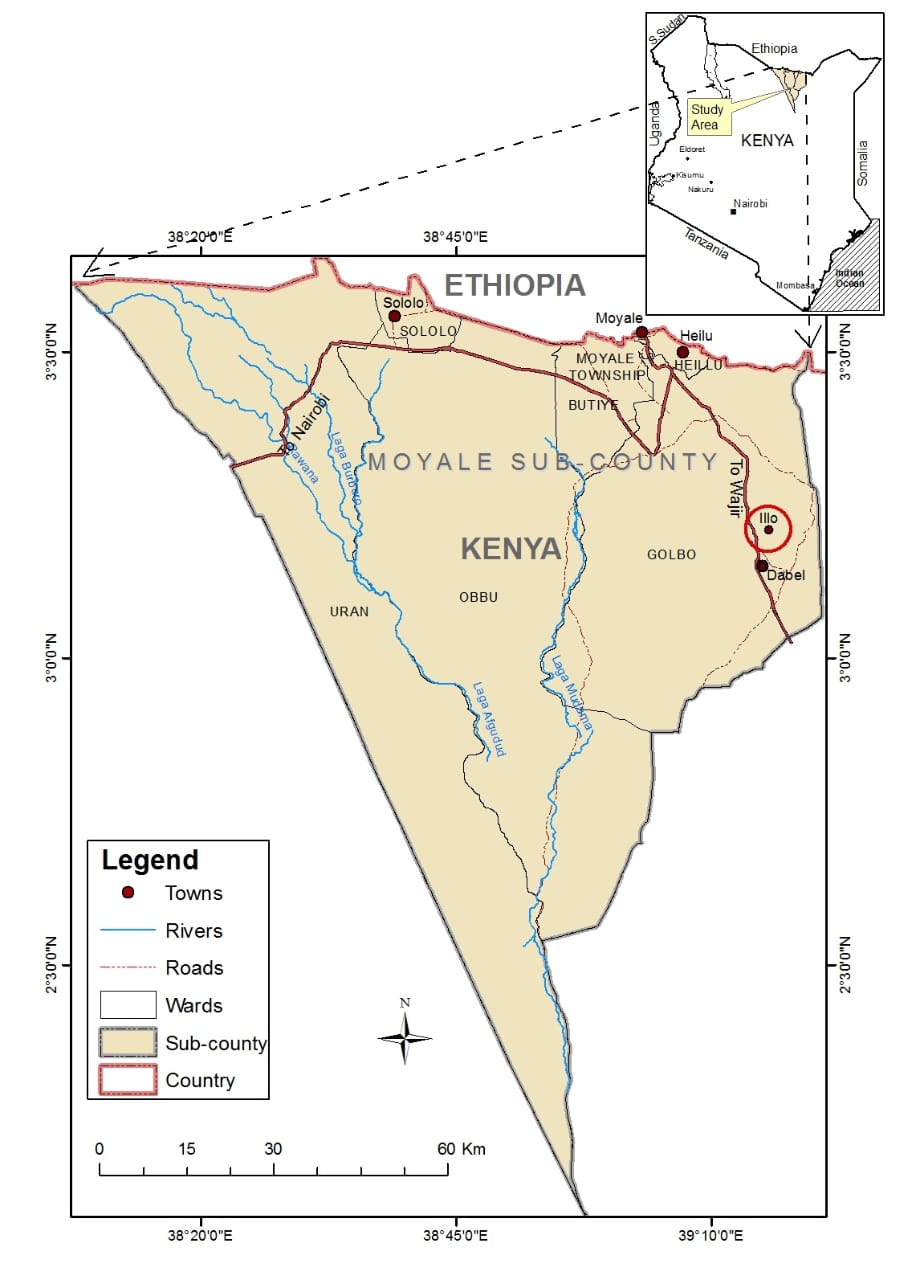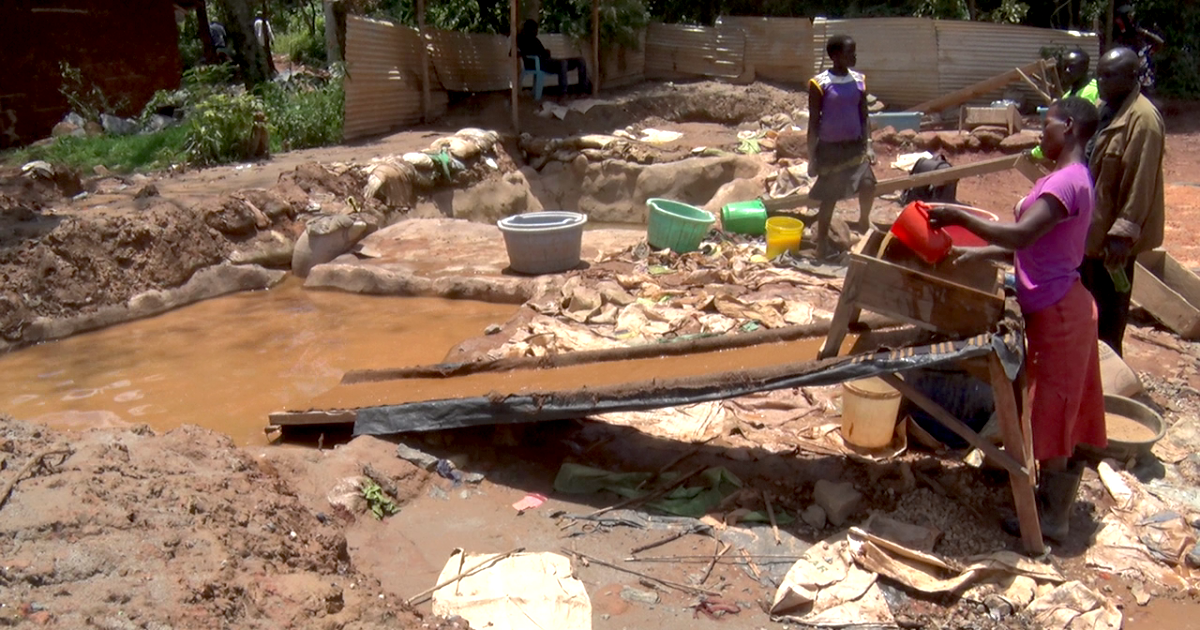Nestled in the vast semi-arid savanna of Dabel in northern Kenya, near the border with Ethiopia, lies the makeshift shanty mining town of Illo. The settlement sprang up in six short months starting in January 2023, and now accommodates over 20,000 people from Kenya and neighbouring countries.
Most of the gold mined in Illo is sold illegally in Kenya — with substantial amounts smuggled into Ethiopia by intermediaries for onward transfer to the Middle East, say local sources.
Legal artisanal and small-scale mining contributed $224-million to the Kenyan economy in 2022, representing over half of the country’s mining output. The sector employs roughly 250,000 miners, 40% of whom are women, and supports the livelihoods of over 800,000 people. However, when unregulated, as is the case in Illo, it quickly becomes associated with crime, sexual violence, trafficking, conflict over resources and land, health and environmental hazards and corruption.
 Gold mining in Moyale, northern Kenya. (Graphic: ISS Today)
Gold mining in Moyale, northern Kenya. (Graphic: ISS Today)
Kenya’s Mining Act (2016) recognises the importance of artisanal mining to the sector and the country’s economic growth. The government has also acknowledged the challenges, and in 2019 issued a moratorium on new mining and exploration licences. This froze the issuing of new permits, including for artisanal mining, as efforts were made to clean up the industry and map out the country’s mineral resources.
Kenya has lost billions of shillings in revenue because of the moratorium, which hasn’t prevented unlicensed and illegal mining activities, like those in Illo, from springing up. After lobbying from mining stakeholders, the moratorium was lifted on 3 October 2023. A series of progressive reforms were instituted to streamline the sector, including shutting down 3,000 illegal entities, conducting a countrywide mineral geo-survey, establishing a formula for sharing earnings, and declaring mineral smuggling an economic crime.
It’s too early to tell what impact these reforms will have, but for now, the harms continue. Miners are exposed to hazardous chemicals, extortion by cartels and criminals, poor pricing, labour trafficking and unhygienic working conditions. And environmental degradation continues. The challenges in Dabel are similar to those in artisanal mining sites in other parts of Kenya, like Migori, Kakamega, Transmara, Nandi and West Pokot.
Rush for an income
Barely 50 km from the Kenya-Ethiopia border, the Illo mines have attracted hundreds of migrant miners with no mining permits from Ethiopia, Sudan, Uganda, Tanzania and Somalia. While some are organised in groups, most engage in individual extractive activities.
Haro Jillo, an Ethiopian miner, says middlemen rent out hand-held gold detectors and small digging machines to the migrant miners. One gram of gold can be sold for KES7 000 ($45). “It’s a game of chance,” he says. “Many dig for months and get a few grams only to use the money obtained from the gold to pay the huge debts they owe to traders, leaving them to go home empty-handed. Others strike much gold within a few days.”
Tensions between locals and foreign miners have been simmering for months. Some locals feel they can’t compete with migrants due to a lack of resources and tools for extracting the gold. They fear that Kenya’s mineral wealth is being looted and their lands are being taken over.
While some miners, both locals and migrants, rely on the police to protect their extracted gold, many apparently also rely on illicit firearms for protection. Such reports were however denied by miners who spoke to the Enact organised crime project.
Poor sanitation is also a problem in the sprawling mining town. According to unofficial sources, this triggered a cholera outbreak in May 2023, leading to 15 deaths. Sexual assault, substance abuse and drug trafficking are also rife.
Community friction
Some community members want the mines to be closed, a call initially heeded by the government but later reversed. Other attempts to address the health and security crises at the mines by government agencies have proven futile in the face of competing interests of locals, miners, surrounding communities and national government.
Edin Adi, a local member of the county assembly, is in favour of mines remaining open. He blames the media for hyping the health and security concerns. He says the mines provide a glimmer of hope for thousands of locals and their Ethiopian neighbours who are destitute after drought and famine collapsed their livelihoods.
Ethiopian miner Ismail Ahmed told Enact that the community elders had instituted strict customary laws to address security breaches and disputes between miners. They also enforced backfilling of dug-out mines every Sunday to mitigate environmental degradation.
This aligns with the Mining Act, which calls for the sustainable use of land by restoring abandoned mines to their original state, or to an acceptable and reasonable level, as close as possible to its original state. The National Environmental Management Authority could further support and coordinate these community-initiated responsible mining practices.
Since lifting the moratorium, the government has finalised a countrywide mineral geo-survey and established a formula for sharing earnings. In a move to curb organised crime in the sector, it declared mineral smuggling an economic crime. Along with instituting these reforms at mine level, government needs to fast-track the issuing of new licences to artisanal miners to curb revenue loss.
Establishing devolved and national mining departments at sub-county levels, such as the county artisanal mining committees, is a positive development. It can ensure better regulation, safety and security, and supervision of unregulated artisanal sites and help protect small-scale miners from exploitation by middlemen and poor gold pricing. DM
Halkano Wario, East Africa Regional Organised Crime Observatory, ENACT, Institute for Security Studies (ISS) Nairobi.
Enact is funded by the European Union and implemented by the Institute for Security Studies in partnership with Iinterpol and the Global Initiative against Transnational Organized Crime.
First published by ISS Today.




 Gold mining in Moyale, northern Kenya. (Graphic: ISS Today)
Gold mining in Moyale, northern Kenya. (Graphic: ISS Today)